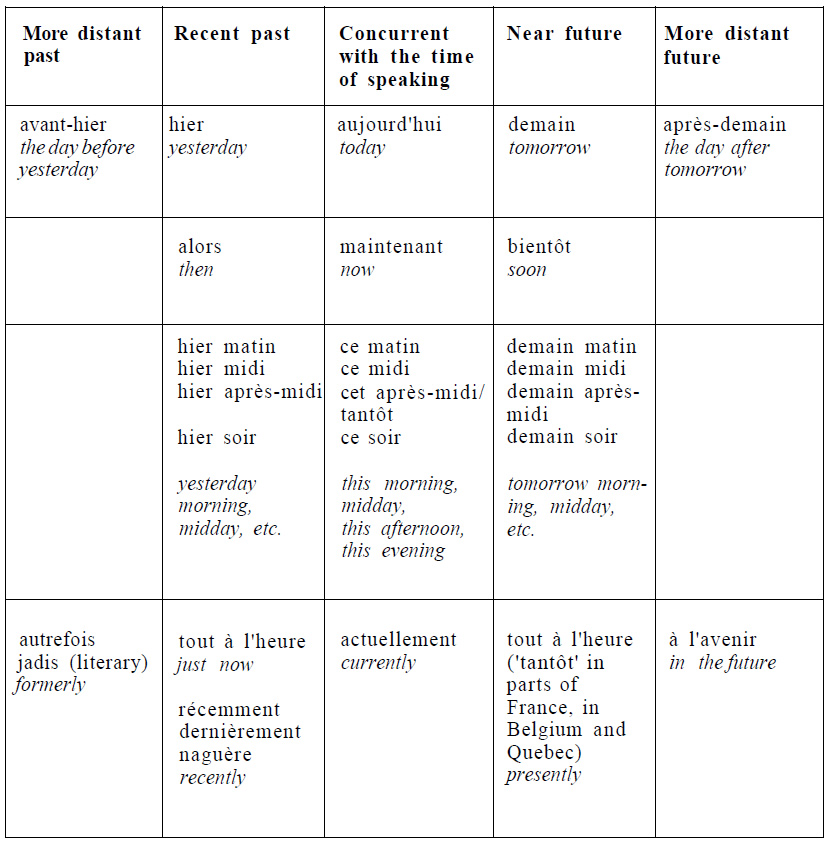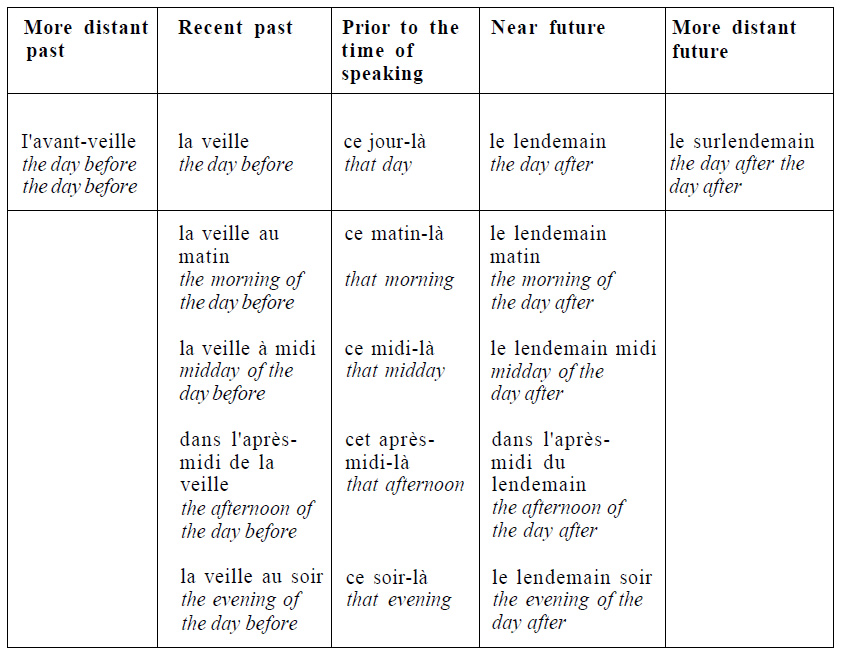Difference between revisions of "Language/French/Grammar/Choice-of-some-time-adverbs-relative-to-the-moment-of-speaking"
m (Quick edit) |
m (Quick edit) |
||
| Line 1: | Line 1: | ||
<div | <div class="pg_page_title"> Choice of some time adverbs relative to the moment of speaking</div> | ||
<div style="float:right; ">{{French-Grammar-Course-Menu}}</div> | <div style="float:right; ">{{French-Grammar-Course-Menu}}</div> | ||
__TOC__ | __TOC__ | ||
The meaning of some time adverbs is determined by their relation to the time of speaking. If someone says: | The meaning of some time adverbs is determined by their relation to the time of speaking. If someone says: | ||
*Je suis arrivé hier | *Je suis arrivé hier | ||
I arrived yesterday | I arrived yesterday | ||
hier refers to the day before the day on which the person is speaking. Similarly, if someone says: | hier refers to the day before the day on which the person is speaking. Similarly, if someone says: | ||
| Line 14: | Line 12: | ||
*J'arriverai demain | *J'arriverai demain | ||
I'll arrive tomorrow | I'll arrive tomorrow | ||
demain refers to the day after the day on which the person is speaking. By contrast, if someone says: | demain refers to the day after the day on which the person is speaking. By contrast, if someone says: | ||
| Line 24: | Line 21: | ||
I arrived the day after | I arrived the day after | ||
le lendemain refers to the day after some point prior to the moment of speaking. Different series of adverbs must be used depending on whether they refer to before or after the actual moment of speaking, or whether they refer to before or after some point prior to the moment of speaking. Examples are presented in the following table: | |||
<span link>Don't hesitate to look into these other pages after completing this lesson:</span> [[Language/French/Grammar/Possessive-determiners|Possessive determiners]], [[Language/French/Grammar/Omission-of-the-article|Omission of the article]], [[Language/French/Grammar/Recognizing-when-an-unstressed-pronoun-is-a-direct-object|Recognizing when an unstressed pronoun is a direct object]] & [[Language/French/Grammar/Fractions|Fractions]]. | |||
== Adverbs and time reference == | == Adverbs and time reference == | ||
[[File:French-Language-Time Reference 1-PolyglotClub.jpg]] | [[File:French-Language-Time Reference 1-PolyglotClub.jpg]] | ||
| Line 32: | Line 30: | ||
<hr> | <hr> | ||
== | ==Other Lessons== | ||
* [[Language/French/Grammar/Adverbs-ending-in-—ment-derived-from-the-feminine-form-of-an-adjective|Adverbs ending in —ment derived from the feminine form of an adjective]] | * [[Language/French/Grammar/Adverbs-ending-in-—ment-derived-from-the-feminine-form-of-an-adjective|Adverbs ending in —ment derived from the feminine form of an adjective]] | ||
* [[Language/French/Grammar/Use-of-en-with-numerals-and-quantifiers|Use of en with numerals and quantifiers]] | * [[Language/French/Grammar/Use-of-en-with-numerals-and-quantifiers|Use of en with numerals and quantifiers]] | ||
| Line 48: | Line 46: | ||
* [[Language/French/Grammar/Compound-nouns|Compound nouns]] | * [[Language/French/Grammar/Compound-nouns|Compound nouns]] | ||
* [[Language/French/Grammar/Proper-Nouns|Proper Nouns]] | * [[Language/French/Grammar/Proper-Nouns|Proper Nouns]] | ||
<span links></span> | |||
Latest revision as of 13:56, 27 March 2023
The meaning of some time adverbs is determined by their relation to the time of speaking. If someone says:
- Je suis arrivé hier
I arrived yesterday
hier refers to the day before the day on which the person is speaking. Similarly, if someone says:
- J'arriverai demain
I'll arrive tomorrow
demain refers to the day after the day on which the person is speaking. By contrast, if someone says:
- Je suis arrivé la veille
I arrived the day before
they are referring to a day before some point prior to the time when they are speaking. Similarly in:
- Je suis arrivé le lendemain
I arrived the day after
le lendemain refers to the day after some point prior to the moment of speaking. Different series of adverbs must be used depending on whether they refer to before or after the actual moment of speaking, or whether they refer to before or after some point prior to the moment of speaking. Examples are presented in the following table:
Don't hesitate to look into these other pages after completing this lesson: Possessive determiners, Omission of the article, Recognizing when an unstressed pronoun is a direct object & Fractions.
Adverbs and time reference[edit | edit source]
Other Lessons[edit | edit source]
- Adverbs ending in —ment derived from the feminine form of an adjective
- Use of en with numerals and quantifiers
- Typical use of the definite article
- Differences in the use of numbers in French and English Dates
- Easy way of generating the simple past
- How to use « il s'agit de » in French
- Position of object pronouns with imperatives
- Repetition of the definite article
- Comparative and superlative forms of adverbs
- Intransitive Verb constructions
- Wrong use of neutral le in phrases where 'it' occurs in English
- il or ça alternating with noun phrase subjects
- Ordinal numbers
- Compound nouns
- Proper Nouns

